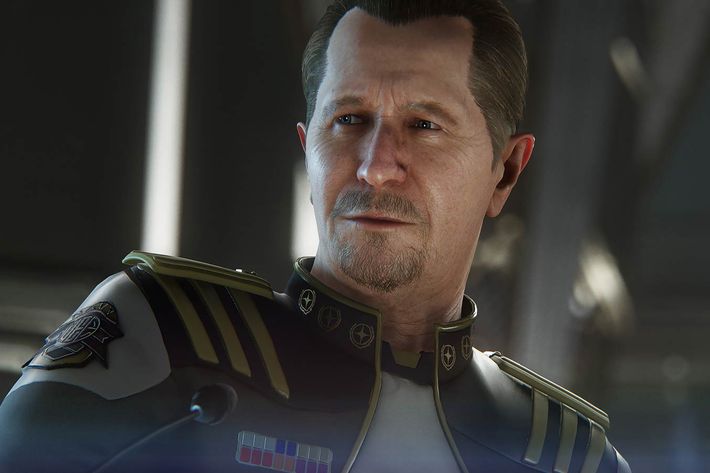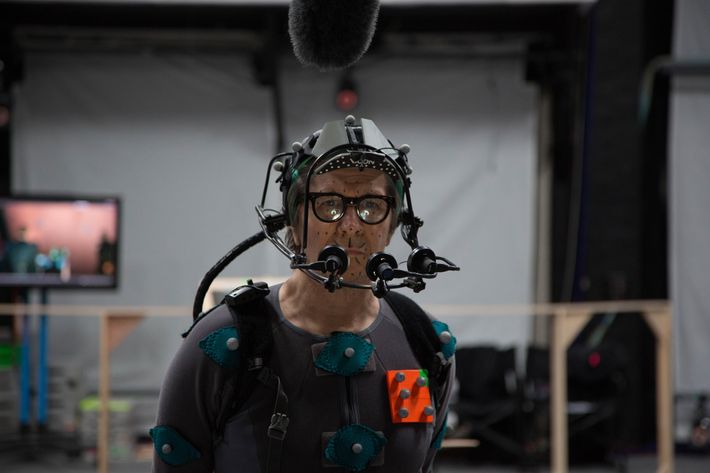
In the upcoming PC game Star Citizen: Squadron 42, Gary Oldman stars, via full performance capture, as Admiral Ernst Bishop, who is on the front lines of a space battle against an alien race. Joining the 57-year-old actor in the star war is a cast that includes Jack Huston, Gillian Anderson, Mark Strong, Mark Hamill, John Rhys-Davies, and Andy Serkis. (An online, open-world Star Citizen game is available in beta form now, with the star-studded action campaign spinoff Squadron 42 launching on a TBA date in 2016.) Vulture recently caught up with Oldman, who discussed his experiences making the game, the future of crowdfunded movies, and his sci-fi history.
What was it like playing Admiral Bishop?
I’ve done a few of games before, and did motion-capture performance with Bob Zemeckis on A Christmas Carol. It’s strange, because normally you have costumes and physical sets and props, and here the world is completely imagined and left solely up to the directors and the designers. It’s a great role to play, and the approach to it, in that sense, is just like any other role, but it’s also very odd, since there is absolutely nothing there. It’s all left up to the imagination. I worked with Chris Roberts, the director, who showed me visual material and talked through the geography of where I was and how I was interfacing with the things in the Senate and on the ship.

You’ve been involved in a lot of games over the years. What attracts you to that medium?
These things come across my desk much the same way as any other role. They’re acting roles, at the end of the day, and each game sets up some particular hurdles that you have to go through. One is more of a vocal performance, for example. And each one offers something new. I’m always amazed at how quickly the technology advances. I honestly don’t know how they come up with this stuff. It seems like just a matter of months before something is obsolete.
A Christmas Carol was released six years ago, but for technology, that was ages ago. How have you seen performance capture evolve since then?
In terms of what they do now, the technology we used on Christmas Carol was prehistoric. With Squadron, the capturing of the performance was a lot simpler than it used to be. They were using fewer cameras. The motion-capture suit that one wears is more actor-friendly. The headgear that one wears is lighter. But it still needs tweaks. In that sense, it’s still a bit in its infancy, because the people that design the gear are not performers, and there’s a difference between wearing something for ten minutes and wearing something for 12 hours and performing in it.

But what they can do now is show you playback. In the Zemeckis days, you were completely blind. Talk about running on faith. The digital quality of the piece is also greatly improved. That’s what was exciting about coming into it in the first place. The technology on this particular venture really is quite groundbreaking. It’s unlike anything I’ve ever been involved with — and I’ve just seen one tiny piece that’s been put together in a rough form. I was completely amazed and blown away by the quality of the image.
Chris Roberts has raised over $90 million to fund Star Citizen. What are your thoughts about how crowdfunding is changing not only video games, but also Hollywood?
Chris has been very clever in the way that he’s done it, because fans become a participant in the actual game. For a certain cost, I think you even have your own spaceship with your name on it, and you’re flying around in this universe that he’s created. It’s an ingenious way of going straight to the fans. This is exciting for these gamers and their involvement, and it’s a project that can raise that kind of money.
Maybe this is the future of filmmaking. You do really cut out literally everyone and just go straight to the fans. It’s supply and demand. You go to the people and say, “Look, we have this idea. It’s going to cost so much. It’s about this and it’s about that.” And they say, “Yeah, we would like to see that.” I’m sure they’re going to find ways of controlling it and taxing it eventually. The government will get wise to something like this.
From your two latest projects, Star Citizen and The Space Between Us, to Robocop and Rise of the Planet of the Apes, you’ve spent a lot of time doing sci-fi. Is there something about the genre that draws you to it?
I suppose it still comes down to a good story, really. I’ve also dabbled in the world of vampires and the supernatural, but it just comes down to a good story, really, and good writing. I’m not particularly a big sci-fi buff, but I was attracted to it because of Chris’s résumé and the quality of the storytelling and worlds and where this can go. With The Space Between Us, it’s sci-fi that is very much the world we’re living in. It’s about a boy who is born on Mars, and we’re already talking about putting men and women into orbit around Mars by 2035, and by 2050 there will be some kind of colony on Mars. It’s as if we’re catching up with the future.

